- ON THE DECADE
- THE DECADE'S CAMPAIGN
- REPORTING ON PROGRESS
- THE DECADE'S PROGRAMMES
- FOCUS AREAS
-
- Access to sanitation
- Financing water
- Gender and water
- Human right to water
- Integrated Water Resources Management
- Transboundary waters
- Water and cities
- Water and energy
- Water and food security
- Water and sustainable development
- Water and the green economy
- Water cooperation
- Water quality
- Water scarcity
- FOCUS REGIONS
- RESOURCES FOR
- UN e-RESOURCES
Water at Rio+20
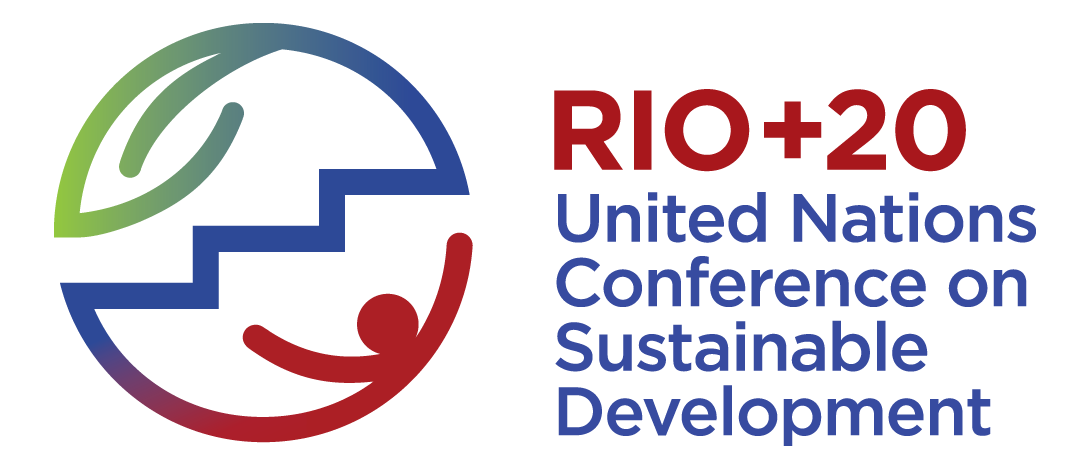 Water Given a Central Focus at the 21st June Rio+20 Roundtables
Water Given a Central Focus at the 21st June Rio+20 Roundtables
22 June 2012 - Two roundtables convened to consider the theme "looking at the way forward in implementing the expected outcomes of the Conference." Among the suggestions offered by Heads of State and Government, and Ministers were: that the outcome document should be translated into a timely, result-oriented process; the SDGs should include a goal on water and sanitation, and the energy, food and water nexus; and the need to arrive at a definition of green economy, taking account of the rights of developing countries to define their national priorities. Specific goals, targets and initiatives were identified by some speakers, including the need to develop partnerships on clean water and waste management for the poorest communities in cities. Based on Earth Negotiations Bulletin reporting services from IISD.
>> Earth Negotiations Bulletin Vol. 27 No. 50 
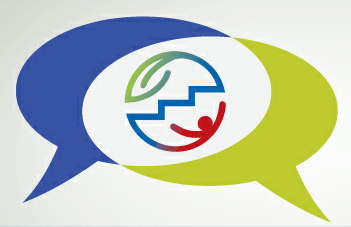 Reporting from Sustainable Development Dialogues Session on Water
Reporting from Sustainable Development Dialogues Session on Water
18 June 2012 – Sustainable Development Dialogues sessions focused on ten recommendations emanating from a public online vote, and provided a platform for refining and proposing additional recommendations, with the objective of the sessions to produce three final recommendations to be delivered to the Heads of State and government.
The water dialogue was attended by about 2000 people. Panelists welcomed this exercise of on-line democracy. The moderator highlighted that it was clear that water has become a political priority as shown by the fact that the session was also attended by the King of Sweden and the former President of Brazil.
Several panelists supported the recommendation of implementing water and sanitation as a human right (recommendation 3). The panelists also gave priority to water security given the cross cutting nature of water as a means to achieve the health agenda, the environment agenda and the economic agenda (for productive uses). Discussions also focused on implementing IWRM reforms (recommendation 5) and integrating water policies into national development plans, encouraging transnational cooperation and solidarity on water.
>> Reporting of water session from UNW-DPAC 
>> Summary of interventions by IISD
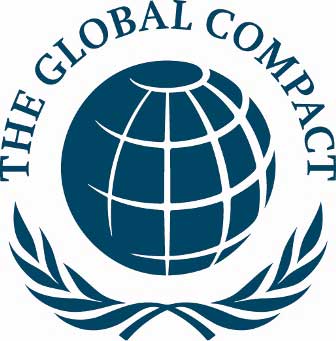 Business Leaders Commit to Water Sustainability at Rio+20
Business Leaders Commit to Water Sustainability at Rio+20
18 June 2012 - A group of 45 chief executive officers, representing a diverse range of global companies and regions, announced on 18 June a major commitment to advance corporate water management practices, and called on governments attending the Rio+20 Earth Summit to make global water security a top priority. The CEOs – all of whom are endorsers of the Global Compact's CEO Water Mandate – outline a range of public policy actions they believe governments should undertake to make meaningful progress on water and to better leverage the resources and capabilities of the international business community.
>> More about the CEO Water Mandate
- Access to water and sanitation. In today’s world, there are still 780 million people without access to an improved drinking water source and 2.5 billion people are still without improved sanitation. In July 2010, the United Nations General Assembly explicitly recognized the human right to water and sanitation and acknowledged that clean drinking water and sanitation are essential to the realisation of all human rights. The push toward global commitments on universal access to water and sanitation has been included in the outcome document.
- Integrated Water Resources Management (IWRM). IWRM is now accepted internationally as the way forward for efficient, equitable and sustainable development and management of the world's limited water resources and for coping with conflicting demands. The status of development and application of IWRM approaches have been an important issue addressed at Rio.
- Water cooperation. Nurturing the opportunities for cooperation in water management among all stakeholders and improving the comprehension of the challenges and benefits of water cooperation can help build mutual respect, understanding and trust among countries and promote peace, security and sustainable economic growth. Enhancing cooperation and strengthening dialogue to resolve current water issues is crucial to address sustainable development challenges.
- Water in the Green Economy. Water in the green economy focuses on the socio-economic opportunities that proper water management provides to social and economic development, whilst also safeguarding freshwater ecosystems. Transitioning to a green economy in water requires a shift from current practice. Rio+20 has encouraged international efforts to help countries build a green economy in the context of sustainable development and poverty eradication.
119. We recognize that water is at the core of sustainable development as it is closely linked to a number of key global challenges. We therefore reiterate the importance of integrating water in sustainable development and underline the critical importance of water and sanitation within the three dimensions of sustainable development.
120. We reaffirm the commitments made in the Johannesburg Plan of Implementation and Millennium Declaration regarding halving by 2015 the proportion of people without access to safe drinking water and basic sanitation and the development of integrated water resource management and water efficiency plans, ensuring sustainable water use. We commit to the progressive realization of access to safe and affordable drinking water and basic sanitation for all, as necessary for poverty eradication, women's empowerment, and to protect human health, and to significantly improve the implementation of integrated water resource management at all levels as appropriate. In this regard, we reiterate our commitments to support these efforts in particular in developing countries through the mobilization of resources from all sources, capacity building and technology transfer.
121. We reaffirm our commitments regarding the human right to safe drinking water and sanitation, to be progressively realized for our populations with full respect for national sovereignty. We also highlight our commitment to the 2005-2015 International Decade for Action "Water for Life."
122. We recognize the key role that ecosystems play in maintaining water quantity and quality and support actions within the respective national boundaries to protect and sustainably manage these ecosystems.
123. We underline the need to adopt measures to address floods, droughts, and water scarcity, addressing the balance between water supply and demand including where appropriate non-conventional water resources, and to mobilize financial resources and investment in infrastructure for water and sanitation services, in accordance with national priorities.
124. We stress the need to adopt measures to significantly reduce water pollution and increase water quality, significantly improve wastewater treatment, and water efficiency and reduce water losses. In order to achieve this end we stress the need for international assistance and cooperation.
UN-Water, as the inter-agency mechanism that promotes coherence in, and coordination of, UN system water-related actions, has organized the following meetings and conferences in preparation for Rio+20:
- 4 May 2012: Side event 'UN-Water Report on Water Resources Management for Rio+20 Summit'. UN Headquarters, New York.
- 16 November 2011: UN-Water session at Bonn2011 Nexus Conference ‘The Road to Rio. Water for Development and Poverty Eradication’. Bonn, Germany.
- 3-5 October 2011: International UN-Water Conference ‘Water in the Green Economy in Practice: Towards Rio+20’. Zaragoza, Spain.
- 7 March 2010: Side event ‘How the Green Economy depends on Water’. UN Headquarters, New York.
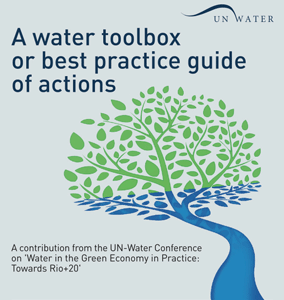 Water toolbox: A contribution to Rio+20 [
Water toolbox: A contribution to Rio+20 [ - 639.7 KB]
- 639.7 KB]
This water toolbox – or best practice guide of actions, instruments and policies – provides proposals based on the analysis of existing practice, reflecting specifically on scaling up of lessons learnt and the relevance for developing and transition countries.
The water toolbox proposes six tools which can be used to promote change and support the transition towards a green economy: (1) economic instruments; (2) sustainable financing; (3) investments in natural capital; (4) technology; (5) green jobs; and (6) water planning.
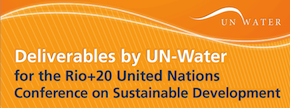 Deliverables by UN-Water for the Rio+20 United Nations Conference on Sustainable Development [
Deliverables by UN-Water for the Rio+20 United Nations Conference on Sustainable Development [ - 636 KB]
- 636 KB]
This summary document presents UN-Water's contribution to the Rio+20 process. It builds on the UN-Water Statement for Rio+20 and takes into account feedback received at different levels.
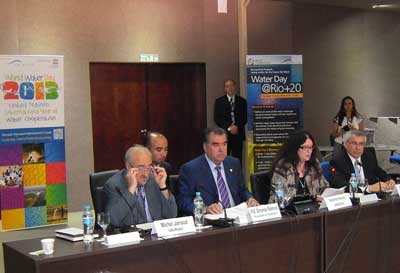 Water Day at Rio+20
Water Day at Rio+20
19 June 2012 - UN-Water organized a Water Day at Rio+20 with the following objectives:
- Demonstrate to the broad range of stakeholders, particularly decision makers, that some of the major challenges facing humanity today relate to water management; this will be based on findings of the major UN-Water reports.
- Identify major water issues that connect with the themes of the Rio+20 Conference, particularly its link with the notion of green economy.
- Focus on the means of implementation, especially the action areas where UN organizations and agencies can act together through UN-Water.
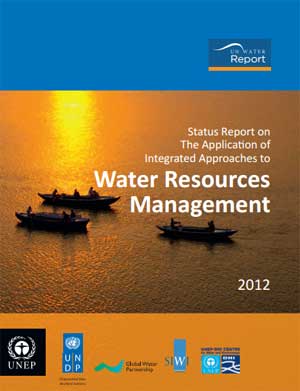 Release of 'UN-Water Status Report on the Application of Integrated Approaches to the Development, Management and Use of Water Resources 2012'
Release of 'UN-Water Status Report on the Application of Integrated Approaches to the Development, Management and Use of Water Resources 2012'
19 June 2012 - Based on a global survey assessing the progress and outcomes of the application of integrated approaches to the development, management and use of water resources, this UN-Water report includes lessons learned and recommendations, as well as focus areas for action. The report also provides guidance for establishing a regular international monitoring and reporting framework to promote sustainable development and management of water resources. The Report was presented on 19 June during Water Day, a day on water issues organized by UN-Water at Rio
>> Key messages and recommendations from the report [ - 938 KB]
- 938 KB]
>> Status Report on the Application of Integrated Approaches to Water Resources Management 2012 
>> Press release 
>> Press conference on the launch of the Report
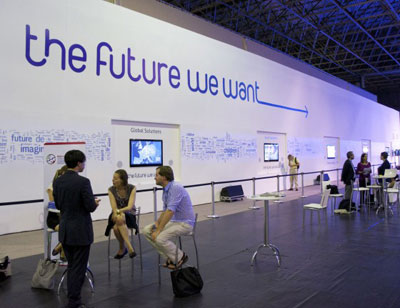 The Future We Want Campaign
The Future We Want Campaign
"The Future We Want" Campaign aimed to engage people around the world in an exercise to envision how societies in all parts of the world can build a future that promotes prosperity, equity and improves people's quality of life within the Earth's life support systems. The result of the campaign was a "Solutions and Visions" exhibit launched on 21 June 2012 at Rio+20. Since December 2011, people from around the world submitted their visions as videos, drawings, and photographs covering global, suburban, rural and urban topics. The project aimed to inspire a "global conversation" about sustainability and to visualize every day people's solutions that show what sustainability, an abstract concept for many, might look like in 2030. After Rio+20, the Future We Want exhibition team is preparing to roll out a comprehensive process for realizing sustainable development that involves five stages of engagement including; community engagement, synthesis of ideas, visualization of solutions, implementation and measurement.
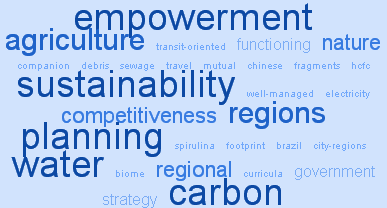 Voluntary commitments
Voluntary commitments
All participants at Rio+20 were encouraged to make voluntary commitments to deliver concrete results for sustainable development. Commitments were invited from various stakeholders, businesses, other Major Group organizations, associations, academic institutions, philanthropic organizations, UN entities, partnerships involving more than one stakeholder, and Member States. The UN Conference on Sustainable Development Secretariat has reported receiving 715 voluntary commitments, including commitments that will mobilize more than US$500 billion in action towards sustainable development; these include 52 government commitments, 82 UN/IGO commitments and 581 Major Group and civil society commitments. Commitments made for water included accelerating progress on MDG7 target on sanitation, fostering implementation of the human right to water and sanitation in Latin America or improving global water quality among others.
The Rio+20 Secretariat is compiling commitments in an online compendium on the Rio+20 website and welcomes registration of voluntary commitments throughout 2012.
>> Make your commitment for water!
>> Check out commitments made for water
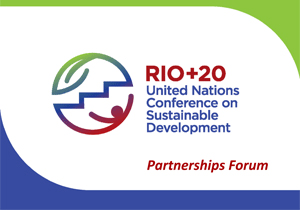 Partnerships at Rio+20
Partnerships at Rio+20
The opportunity of forming coalitions/partnerships was enthusiastically embraced by many in Rio and these are expected to support follow up after Rio. From 20 to 22 June, a Partnerships Forum was organized. The Forum consisted of highly dynamic and interactive sessions to highlight the significant contributions of partnerships to the implementation of sustainable development. 29 partnerships on water were registered.
>> Information note: Questions and Answers on Water in Rio+20 
Don't miss this information note which provides you information on questions and issues raised in the Rio+20 negotiation process on water and much more.
>> Rio 20 Issue Brief : Water
UNCSD Secretariat.
December 2011
This brief is aimed at providing a basic reference relating to international time‐bound commitments in the area of water, with a view to facilitating discussion around water resources, management and quality in the course of the preparation for Rio+20.
>> Water for the World: facts and figures, stories, videos
>> Water Brief for Rio+20
World Bank
>> UNSGAB Recommendations for Rio
>> Friends of Water Recommendations for Rio
>> UN-Water Statement to Rio+20
>> Stockholm Statement to Rio+20
>> Natural Capital Declaration
The Natural Capital Declaration (NCD), is a commitment by CEOs from the finance sector. The NCD was born out of the insight that financial institutions could benefit from greater guidance to embed specific aspects of environmental, social, and governance (ESG) factors in their risk management, due diligence, loans, investments, and insurance activities. On 16 June 2012, at Rio+20, CEOs at the helm of 37 banks, investment funds, and insurance companies announced their commitment to work towards integrating natural capital considerations into their products and services.
>> Water and a Green Economy in Latin America and the Caribbean
UNECLAC and UNW-DPAC
June 2012
>> Water planning in the transition to a green economy
Ebro River Basin Authorithy and UNW-DPAC
June 2012
>> The contribution of water technology to job creation and development of enterprises
UNW-DPC
February 2012
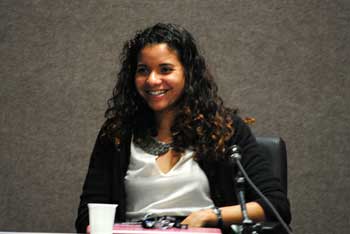
>> Olimar Maisonet Guzmán
UNCSD Major Group for Children and Youth
"It is necessary for Member States to put in place safeguards to protect citizens' water access during the development of private-public partnerships, especially given the importance of private actors in the implementation of the Rio+20 Green Economy Framework."
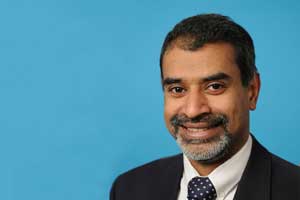
>> Sanjay Wijesekera
Chief of Water, Sanitation, and Hygiene, Programme Division, UN Children's Fund (UNICEF) on UN Seven Issues, Seven Experts series
"There is a lot people can do. The human rights approach is people-centered, regardless on where people are. People within countries that are donors of development aid have to remind their government, especially in these difficult times, of their obligation in helping people to achieve their rights to water and sanitation, education and health, and many things that too many people across the world do not have access to."
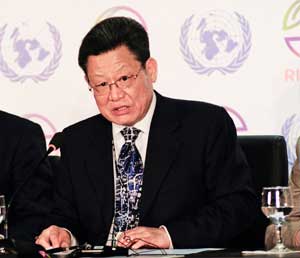
>> Sha Zukang
Secretary-General of the UN Sustainable Development Conference
"So far, we have noted a broad and enthusiastic support for sustainable development goals (SDGs). These would complement the Millennium Development Goals (MDGs), and they would be universal and measurable. In this regard, I am pleased to see that Member States are committed to a high level of ambition for Rio, anchored on action. Just to name a few issues, these could include universal access to modern energy, clean water, and eradication of hunger."
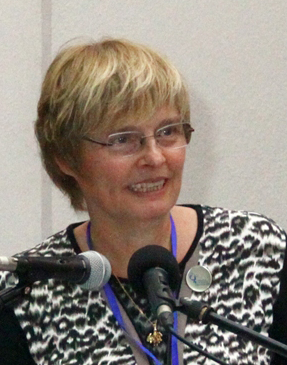
>> Alice M. Bouman-Dentener 
President Women for Water Partnership
"Water = Life. We all know that. We should stop questioning and debating the obvious. Given the fact that so many millions on our globe still lack access to this life bringing resource, we should use our time and energy to solve that problem by putting the vast number of already agreed principles into practice. Let us please move from vision to action."
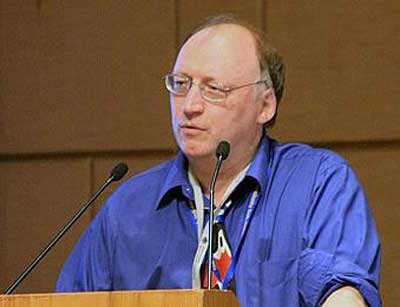
>> Felix Dodds 
Executive Director, Stakeholderforum
"Rio is already a success it has redefined the Millennium Development Goals (MDG) agenda to a Sustainable Development Goals (SDG) agenda which would not have happened without Rio."
Copyright | Terms of use | Privacy notice | Site Index | Fraud alert | Help




